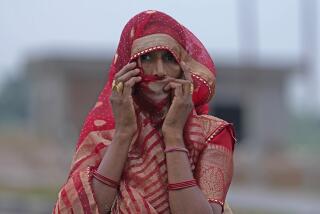Popular Indian guru’s anticorruption fast turns violent
- Share via
Reporting from New Delhi and Islamabad, Pakistan — A popular yoga guru retreated to his plush ashram Sunday claiming the Indian government was out to kill him after police forcibly removed the televangelist from a “fast-unto-death” hunger strike against corruption and scattered tens of thousands of his followers.
The showdown in New Delhi had been building for days, after the saffron-robed, barefoot guru Ram Krishna Ramdev, known as Baba Ramdev, went ahead with his threat to lead a mass hunger strike in the capital.
Police in protective gear moved in early Sunday, using truncheons and tear gas against his followers and sparking panic in and around the massive tent they’d put up at the Ramlila Ground.
By afternoon police were still closely guarding the empty tent and the hospital where injured supporters were taken, in a bid to prevent further gatherings. As an uneasy calm ensued, both sides were left wondering whether they’d overplayed their hand in a political showdown that’s bordered on farce.
“Whether Ramdev is really fighting corruption or just looking for publicity is a question,” said Pran Chopra, a political analyst. “But there’s no justification for destroying the meeting. The government very badly mishandled it.”
In the land of Mahatma Gandhi, who famously used fasting as a pressure tactic against the British colonial rulers, hunger strikes remain an effective political threat.
But Ramdev, who has vowed to launch another fast, is hardly Gandhi. His two trusts own 1,000 acres of prime land and enjoy at least $245 million in annual revenue, allowing him to travel by private plane and retreat to a private island off Scotland. His controversial claims include statements that homosexuality, and AIDS, can be “cured” through yoga.
Ramdev’s huge following — up to 20 million tune in daily to his early morning television in India alone — as well as support from right-wing Hindu nationalists have led to dreams of his own party.
All of which has made Ramdev a threat to the ruling Congress party, for which corruption is a sensitive issue. India has weathered a rash of graft scandals involving billions of dollars over the last year in the telecommunications, sports and defense sectors.
In April, mounting public frustration focused on Anna Hazare, a longtime anticorruption activist who went on a fast to pressure the government into giving watchdogs a role in drafting a national anticorruption bill. He succeeded after a four-day hunger strike, but negotiations have since gone off track and Hazare is threatening another fast.
After Hazare’s early success, Ramdev decided to try his hand too, calling for the return of all “black money,” a popular term for unreported income and funds secreted overseas by corrupt politicians and businesspeople to avoid taxes.
“Ramdev’s trying to jockey himself as an important person in the anticorruption fight,” said Murali Krishnan, national political editor with the Indo-Asian News Service. “But he doesn’t know anything about it.”
Some of Ramdev’s prescriptions appear rather unorthodox. To curb corruption, he has called for a mandatory death penalty for all corrupt officials and a ban on high denomination notes, such as the 500-rupee and 1,000-rupee bills, worth about $11 and $22, respectively. He also wants to end Western influences, calling for a ban on all Western medicine, schooling in English, and government, tax and justice systems inherited from the British colonial era.
“It’s not an effective way to fight corruption,” said Veronica Peris, director of New Delhi’s Initiatives of Change Center for Governance, a civic group. “It smacks of [politics]. I don’t think he’ll succeed. Indian voters are more astute than that.”
At a news conference Sunday at his sprawling ashram in Haridwar, north of New Delhi, Ramdev said he wore women’s clothes and eluded police for two hours before they grabbed him. He vowed to fight on, blaming Italian-born Congress Party head Sonia Gandhi for the crackdown, and challenging the government to investigate his trusts for any financial irregularities.
“The government, especially the Congress [Party leaders], do not want to see me alive as my movement can expose their black deeds,” he said.
Officials with the opposition Bharatiya Janata Party promptly announced a 24-hour mass protest against the police crackdown, which they termed a “shameful chapter in the history of Indian democracy.” The Congress Party countered that it would mount its own protest.
Police were forced to step in Sunday, Delhi Special Police Commissioner Dharmendra Kumar said at a news conference, because Ramdev’s original permit for yoga “breathing exercises” was for 6,000 people but up to 10 times as many had gathered, creating a security threat.
“It turned into a chaos and stampede because he, instead of surrendering, ran into the crowd,” Kumar told reporters, denying that police used truncheons.
Television footage showed police wielding truncheons, as well as Ramdev supporters throwing flowerpots and rocks at the police.
“The police unleashed complete mayhem,” added Lokendra Abhay, 28, an income tax lawyer from central Uttar Pradesh state, recovering in Delhi’s Lok Nayak Jai Prakash Hospital. “It was chaos.”
Special correspondent Rana reported from New Delhi and Times staff writer Magnier from Islamabad.
More to Read
Sign up for Essential California
The most important California stories and recommendations in your inbox every morning.
You may occasionally receive promotional content from the Los Angeles Times.










